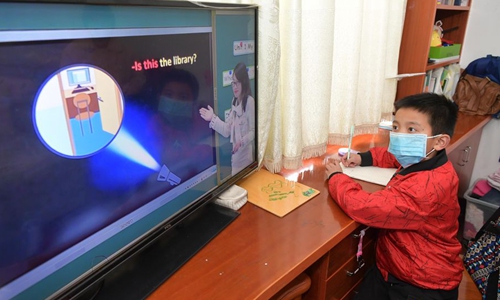HOME >> CHINA,SPECIAL-COVERAGE
Online courses overwhelm students and teachers
By Zhang Hui and Zhao Yusha Source:Global Times Published: 2020/2/12 22:43:40

Gao Xunxuan, a student of No.4 Primary School in Wanli District, attends an online class at home in Nanchang City, east China's Jiangxi Province, Feb. 10, 2020. Photo: Xinhua
Online education, an industry that hugely benefitted from the coronavirus epidemic, is facing an overwhelming backlash from the public.
After the Ministry of Education in late January announced the postponement of the 2020 spring semester for schools nationwide, many schools this week started online courses for students to study at home.
However, the online education, which required teachers to live stream courses using mobile phone software and properly interact with students, proved a challenge for many teachers.
"We are forced to became lousy live broadcasters during this time," a middle school teacher surnamed Wu in Southwest China's Chongqing told the Global Times.
Wu said that at first teachers found it difficult to use the software, and this new way of teaching came so suddenly and so fast that it left teachers with little time to learn.
Some teachers discovered they left the microphones off only after they finished the online course, and others were frequently distracted by their own young children's shouting and crying, or had to repeatedly reconnect to the platform due to poor internet connection.
Some schools offered online courses for almost each subject including sports, and Wu said that physical education teachers found it awkward to give instructions online because many children are under house quarantine, and do not have enough space to move.
Some parents of primary school students interviewed by the Global Times complained that they had to join several different social media chat groups of different subjects, accompanying their children taking online courses just to make sure their children are fully concentrated instead of playing video games or watching soap operas. They even helped children with the homework as teachers tend to talk faster than in school and ignore interacting with students.
Some live steaming platforms were unable to handle large numbers of users at the same time and crashed. Guangdong-based platform Seewo apologized for its temporary crash on its Weibo on Monday as many live steam platforms including Seewo failed to offer stable services after 200 million users logged on, and the platform has never had such a large number of visitors.
A poll on Weibo on whether students would like to have the online courses showed about 386,000 respondents said "no," with only 99,000 respondents saying "yes." Those who said "no" said they had to do more homework than traditional schooling and were easily distracted by noise. Besides, online courses are bad for their eyesight and not fair for students in villages who have limited access to the internet.
Posted in: SOCIETY,FEATURE